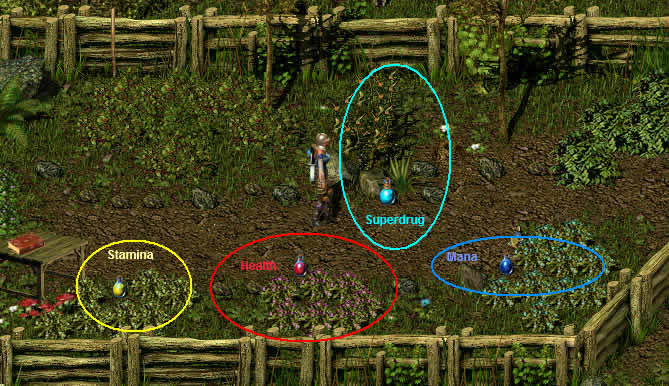Alchemy Guide

This guide will show you how to use the alchemy skill in Divinity. First of all you need the alchemy skill in the survivor path and empty flasks.
The skill has the following levels:
| Skill lvl 1 | mixes potions |
| Skill lvl 2 | mixes and creates small/minor potions |
| Skill lvl 3 | mixes and creates normal potions |
| Skill lvl 4 | mixes and creates super/large potions |
| Skill lvl 5 | allows to use augmentor plants = drag and drop a full minor potion over the plant and gain a normal sized full flask |
Procedure In order to create a potion out of herbs, mushrooms, rotten food or even poison barrels, one thing is very important - you have to stand near enough to the object: it has to be highlighted in grey. Then simply drag and drop the empty flask out of your open inventory into the mushrooms (as shown in the picture) and a filled potion will appear. Please take care only to use the appropriate size of flask your skill level has, otherwise the flask will simply disappear. Small/minor bottles require at least skill level 2, normal sized level 3 and large ones level 4.
In order to create a potion out of herbs, mushrooms, rotten food or even poison barrels, one thing is very important - you have to stand near enough to the object: it has to be highlighted in grey. Then simply drag and drop the empty flask out of your open inventory into the mushrooms (as shown in the picture) and a filled potion will appear. Please take care only to use the appropriate size of flask your skill level has, otherwise the flask will simply disappear. Small/minor bottles require at least skill level 2, normal sized level 3 and large ones level 4.
The potions you create correspond to the colour these herbs and mushrooms have, though the shades differ slightly when it comes to the green potions (poison), mushrooms appear to be grey/white, cacti are green and herbs do not create poison potions. Plants do not grow again, they get used up due to this process.
Standard potions created with plants (requires at least level 2)
The following shows a list of all standard potions that can be created with plants.
 |
Red Potion |
| Health potions (out of red mushrooms/herbs/cacti) | |
 |
Blue Potion |
| Mana potions (out of blue mushrooms/herbs/cacti) | |
 |
Yellow Potion |
| Stamina potions (out of yellow mushrooms/herbs/cacti) | |
 |
Green Potion |
| Poison potions for poisoning skin, weapons or even useful as a thrown weapon (out of white mushrooms, rotten food, poison barrels, cacti) | |
 |
Bright Blue Potion |
| Superdrug, temporary for +100 poison and -100 spiritual resistance (out of the Drudanae plant), though this effect lasts pretty long, it's better to sell it or at least save before trying this out | |
  |
Purple and Grey Elixiers |
| Purple or grey elixiers later on in the game bring back health points+mana = 20 (mage XP only +20 health points) |
If you are in the Wastelands (the end area of the game, you find cacti mainly and can even create more potion varieties: red, blue, yellow, white, green)
Mixed potions
You can create mixed potions by drag&dropping one filled potion over the other (requires at least alchemy skill level 1). The following shows a list of the mixed potions that can be created.
 |
Red + Blue = White |
| Restoration, brings back mana and vitality points | |
 |
Yellow + Blue = Black |
| Shadow, makes invisible, temporary | |
 |
Yellow + Red = Orange |
| Strength, boosts strength, temporary | |
 |
Yellow + White = Purple |
| boosts resistances, temporary | |
Caution: If you drag a small over a normal sized potion, you always get the smaller sized one - same goes for dragging a super over a normal or even a minor potion - so take care to mix even sized flasks.
Boosting Potions
Boosting small/minor potions up to normal sized potions requires alchemy skill level 5.

You can boost a full small/minor flask to a normal sized full potion by dragging it over the augmentor plants.
Comparison of health/mana/restoration potions
(by Raze from the Larian Studios Forum)
Restoration potions are much better than Health or Mana potions. Though you gain one alchemy level as a reward for completing a quest in the Dark Forest, it is better to use one spell point as soon as possible in the game in order to enjoy the advantages.
• 1 minor healing = 40 health points
• 1 minor mana = 40 mana points
• 1 minor restoration = 50% of health and mana
Example: As long as you have more than 80 vitality and magic, restoration potions provide more benefit than the separate health and mana potions they could be made from. At level 40, a minor restoration gives 606 health and 244 mana. Even if you just need health (or just mana) after you have 160 in vitality (or magic), restoration potions become more effective.
Potions are cheap and gold easy to come by. However, if you run into a tough area, would you rather hit the F1 key (or whatever you assign) madly 10 times to use healing potions faster than you are being hit, or once or twice to use a restoration potion?
• 1 normal healing = 100 health points
• 1 normal mana = 60 mana points
• 1 normal restoration = 100% of health and mana points
NOTE: normal and super restoration potions both restore 100% health and mana. It would therefore be rather silly to buy super health, mana or restoration potions. Keep/use any such super potions you find, but just buy normal ones.
• 1 super healing = 200 health points
• 1 super mana = 80 mana points
• 1 super restoration = 100% of health and mana
If you are a mage, that 80 for a super mana potion really sucks, even more than the 200 health does for a melee character.
Keep any rings, amulets, etc. you find with alchemy +1. Empty flasks are cheaper, and there are mushrooms and rotting food all over the place if you use poison weapon or poison skin. Red / blue herbs are around as well, though not as many, for making health / mana potions (then mixing for restoration).
Other items that can be combined
beehive + honeyrack = drop of honey
drop of honey + empty honey jar = full honey jar(temporary increase of +5 strength, agility, intelligence - +50 health/mana points)
bucket/basket + apple or tomato, oranges = full basket/bucket (this increases the value of fruit and vegetables from 1 or 2 gold all the way up to around 10)
Two stacks of straw = Haybed. Combine two stacks of straw on the ground to make hay and then use as a bed. Hay can not be moved once it is made, but you can combine stacks of straw in your inventory. Click on the straw to switch between a pile and bundle of straw
poison barrel + empty flask = poison potion (this does not require the alchemy skill)
wine glass + wine barrel = full wine glass
beer mug + beer keg = full beer mug
Food effects (tested as a female mage)
Velthuijsen, gamer at the Larian Forum says this: "Food that increases stats on intelligence, increases the mana limit for fighters by 3, for survivors by 4 and for mages by 5" - my XP as a mage was an increase of mana limit by 6. These effects are temporary, exception: health/mana points.
Drinks
| Beer | +2 strength, -2 agility/intelligence, -1 offense/defense, -12 mana limit, +40 weight |
| Dwarven Ale | +10 strength, -10 agility/intelligence, -7 offense/defense, +1 damage, -60 mana limit, +200 weight |
| Genever | +5 strength, -5 agility/intelligence, -3 offense/defense, -30 mana limit, +100 weight |
| Milk | +1 strength |
| Water | +10 health points |
| Wine | +2 strength, -2 agility/intelligence, -1 offense/defense, -12 mana limit, +40 weight |
Food
| Apples | nothing, just the basket +1 intelligence |
| Bread | +50 health points, +2 strength, +40 weight |
| Carrot | +1 agility, +1 offense/defense |
| Chicken meat | +5 intelligence, +100 mana points/+30 mana limit |
| Cheese | +10 health points, +1 strength |
| Dinner | +50 health/mana points |
| Fish | +5 intelligence, +10 mana points/+30 mana limit |
| Fruit basket | +1 intelligence, +6 mana limit |
| Grapes | +1 intelligence, +6 mana limit |
| Honey | +50 health/mana points, +5 strength/agility/intelligence |
| Meat | +50 health points, +2 strength |
| Orange | +1 intelligence, +6 mana limit |
| Pepper | -5 intelligence, -30 mana limit |
| Pumpkins | +5 intelligence, +30 mana limit |
| Salt | -5 intelligence, -30 mana limit |
| Tomatoes | Nothing |
| Vegetables | Nothing |
Information about
Divine DivinityDeveloper: Larian Studios
SP/MP: Single-player
Setting: Fantasy
Genre: Action-RPG
Combat: Real-time
Play-time: 40-60 hours
Voice-acting: Partially voiced
Regions & platforms
World
· Homepage
· Platform: PC
· Released: 2002-08-03
· Publisher: Unknown
More information


